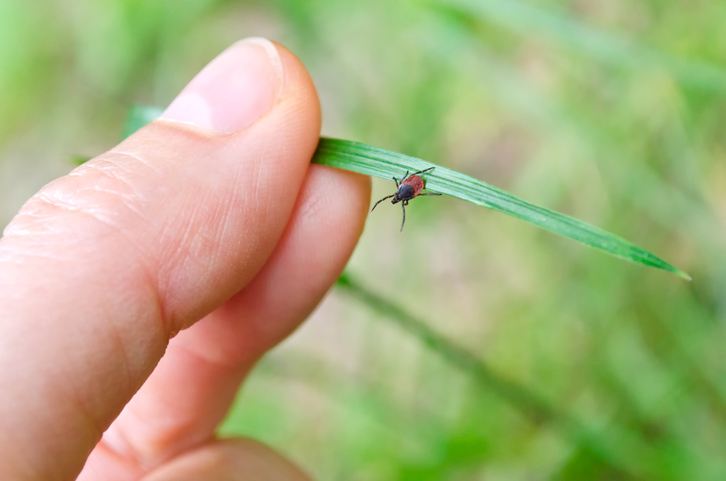
Ticks, and especially their bites, can be really dangerous. These nasty little pests may be small, but they can cause big health problems.
In some areas of the country, depending on the time of year, nearly half of ticks can be infected with diseases like Lyme – an infection that can result in fever, headache and many other unpleasant symptoms.
Without proper treatment of the disease, it can even linger for years, resulting in a wide array of side effects, from memory problems to joint pain, acid reflux, and panic attacks.
Lyme disease affects an estimated 300,000 people in the U.S. every year, primarily in the Northeast and upper Midwest.
These small spider-like critters bite to fasten themselves onto the skin and feed on blood.
They live in the fur and feathers of many birds and animals. Bites most often occur during early spring to late summer, and in areas where there are many wild animals and birds.
Many of the diseases ticks carry, including Lyme disease, bring on flu-like symptoms, such as nausea, headache, fever, vomiting and muscle aches.
Other common tick-borne diseases include Colorado tick fever, Rocky Mountain spotted fever, relapsing fever, tularemia, ehrlichiosis, and babesiosis.
“Mosquitoes kill more people than ticks do, but ticks can infect people with more than one disease at a time,” Marc C. Dolan, M.Sc., a senior research biologist for the CDC in Fort Collins, Colorado told Consumer Reports.
While most people equate ticks with taking a walk in the woods, you don’t have to be walking in the woods to be bitten by a tick – you can be in your own garden or backyard.
Ticks like damp, shady, brushy, leafy areas, where they can wait for something like a person, dog, deer or mouse) to come by. They wait in order to make direct contact.
That’s why it is so important to keep up your guard when you’re outside, including in your own yard or garden.
Reducing ticks in your yard means making your yard less attractive to ticks, and less attractive to animals that carry ticks, like mice and deer. Of course, chemical treatments like insecticides and pesticides come with their own potentially serious risk, to humans, pets, wildlife and the environment, if you need a refresher, some of the problems they cause include:
- Contamination of surface and groundwater, which hurts the quality of our drinking water as well as the quality of aquatic habitats and health of aquatic life forms.
- They threaten the health of children, who are especially vulnerable due to their small size and underdeveloped physiology. They’re also more often exposed to pesticides due to behavior like playing on grass and putting toys into their mouth.
- They threaten the health of pets. When your pets go outdoors, they can be highly exposed to chemicals in the yard because of their behavior, like licking paws that have been contaminated, eating the grass, soil and so on. They’re also much more vulnerable to their effects because of their size.
- The health of wildlife is threatened. Local wildlife are at risk too, such as Canada geese, raccoons, squirrels and a variety of birds.
- They can also threaten the lives of beneficial organisms like earthworms that kill pests, reduce the spread of disease and help plants gather water and nutrients. Chemical pesticides reduce their activity levels which reduce the lawns’ natural ability to control diseases and pests, gather water and nutrients, and maintain overall health.
- They degrade the overall health of your garden and yard because applying pesticides frequently creates a chemical-dependent landscape. When pest species become resistant to the chemicals made to kill them (which commonly occurs), larger, more concentrated doses and more frequent applications are needed, which results in a never-ending cycle of greater pest resistance and pesticide use, and in the meantime, the health of your lawn and garden takes a downhill dive.
Obviously, you can see why using natural ways to keep ticks out of your garden is a far better way to tackle this problem.
9 Natural Ways To Keep Ticks Out Of Your Garden
1. Mow your lawn regularly
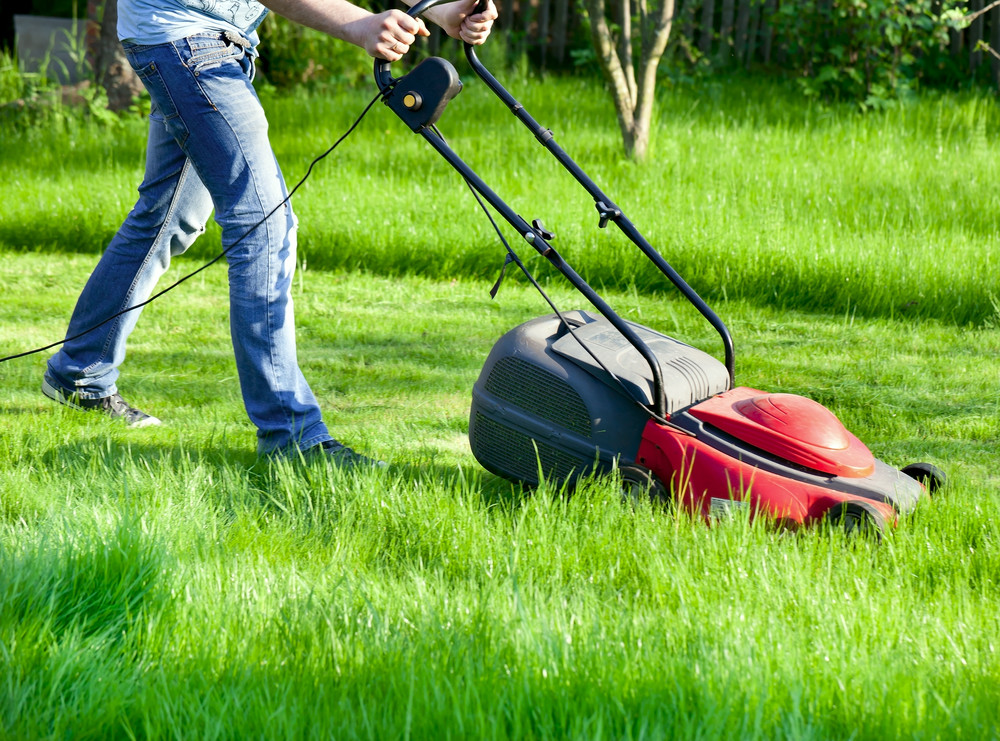
Mowing your lawn regularly is important for getting rid of the ticks’ favorite spots to hang out.
That includes starting by getting rid of any tall brush and grass, particularly at the edge of your lawn.
Keep grass cut short as ticks are more likely to be found in taller, unmown grasses and shrubs, where they wait to attach to a passing person or animal.
While you’re at it, prune any low lying bushes to let in more sunlight, which keeps the yard from being so damp and shady, so ticks will be less attracted to the area.
Read More: 8 Clever Ways To Use Grass Cuttings You May Not Have Thought Of
2. Remove all trash and debris
It’s also essential to clean up leaf litter, like decomposing leaves where ticks can live, that can be raked up and removed.
Instead of tossing the grass clippings and leaves into the trash, add them to your compost pile where you can take advantage of the rich soil amendment in your garden.
After drying, the grass clippings make excellent mulch which can help weeds from sprouting up, and help the soil retain water.
If there is any trash in your yard, including things like piles of sticks, remove them. If you store your trash outside until garbage day, just make sure it’s away from the safe zone.
Debris attracts host animals like rodents and it is a safe harbor for ticks as well.
The first step is just to make sure your yard is nice and clean, which your neighbors will appreciate anyway!
3. Create a barrier
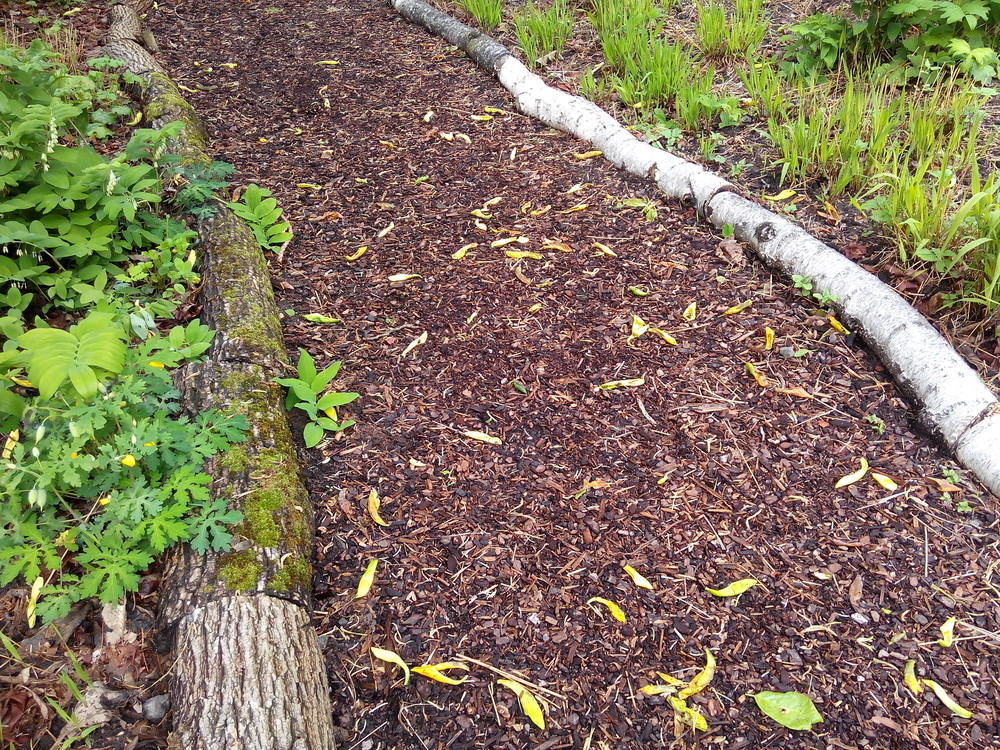
As ticks love hanging out in the area where the woods meets the lawn, by eliminating a wooden edge and creating a barrier, it can help keep them out.
There are many different things you can use to make an artificial border – there should be about a yard in between the lawn and the woods.
You can try anything from wood chips or sand to crushed stone or sawdust.
There has been some research conducted to determine which materials are best, but more is still needed, the most promising appears to be sawdust, specifically from the Alaska yellow cedar tree.
4. Make paths uncomfortable on bare feet
While it’s no fun to walk over irritating surfaces with bare feet, if you make them uncomfortable, you can deter ticks.
That’s because they don’t like to cross paths that are lined with rough things, like gravel or wood chips. It’s kind of like a human walking on glass, not a very pleasant experience.
Place a gravel or wood chip buffer zone between your lawns and wooded areas to help keep ticks from crossing onto your property.
5. Prevent deer from getting in and control other host animals
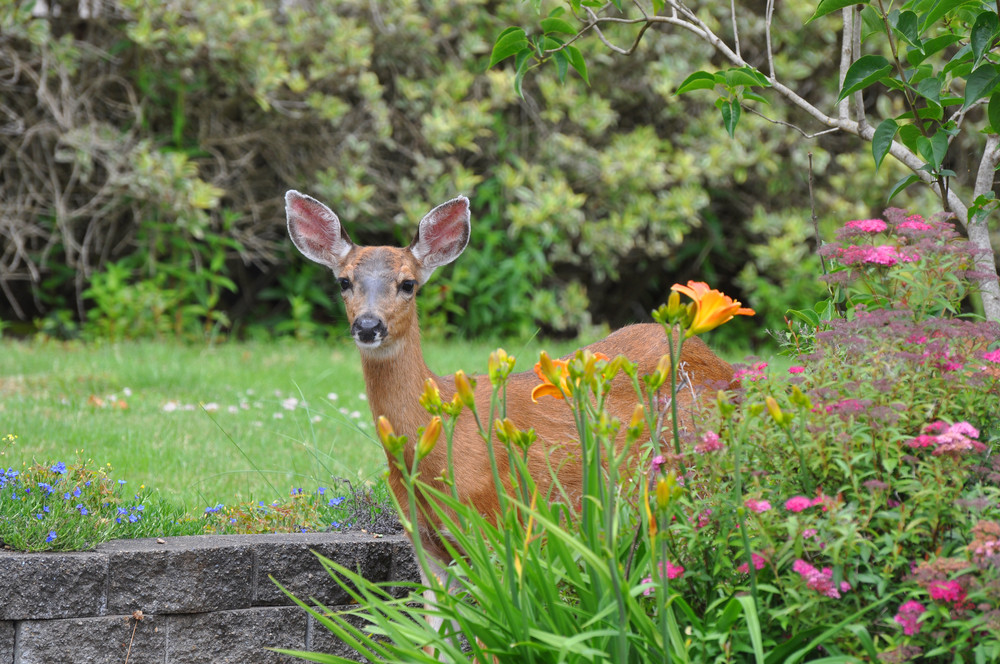
It’s also important to keep tick-carrying animals like deer out of your yard – those deer can wreak havoc on your garden too, so that gives you more reason to fence it in.
In the northeast, mid-Atlantic and north-central states, deer ticks carry the disease; on the Pacific Coast, blacklegged ticks, who also like traveling on deer, spread Lyme disease, according to the CDC.
While blacklegged ticks can’t contract the bacteria that causes Lyme disease from deer, the adult ticks feed and reproduce on them, which means reducing the number of deer and an area generally reduces the number of ticks.
Deer can be kept out by using fencing, which should extend partly underground and not have gaps bigger than 6×6 inches where the animals can squeeze through or crawl under.
Enclose the entire garden, or deer will go around the fence.
The fence should also be at least 8 feet high – some deer can even clear an 8-foot fence unless obstacles are placed, such as thorny shrubs or tree branches, which prevent a clear take-off or landing place.
You can also place deer-repellent plants around the perimeter.
They avoid plants with a strong fragrance, irritating textures, or plants that upset their stomachs. For instance, lavender is a deer resistant plant.
What we find so appealing is completely distasteful to them.
Others include garden perennials like lupines, campanula bellflowers, echinacea, and digitalis foxglove. American beautyberry bushes are handsome plants and the leaves have been shown to repel ticks.
It’s important to keep other host animals that can carry ticks away too.
You might want to treat the area with certain substances like ammonia or hot sauce, or plant spearmint, which most creatures don’t like.
6. Keep woodpiles neat and organized
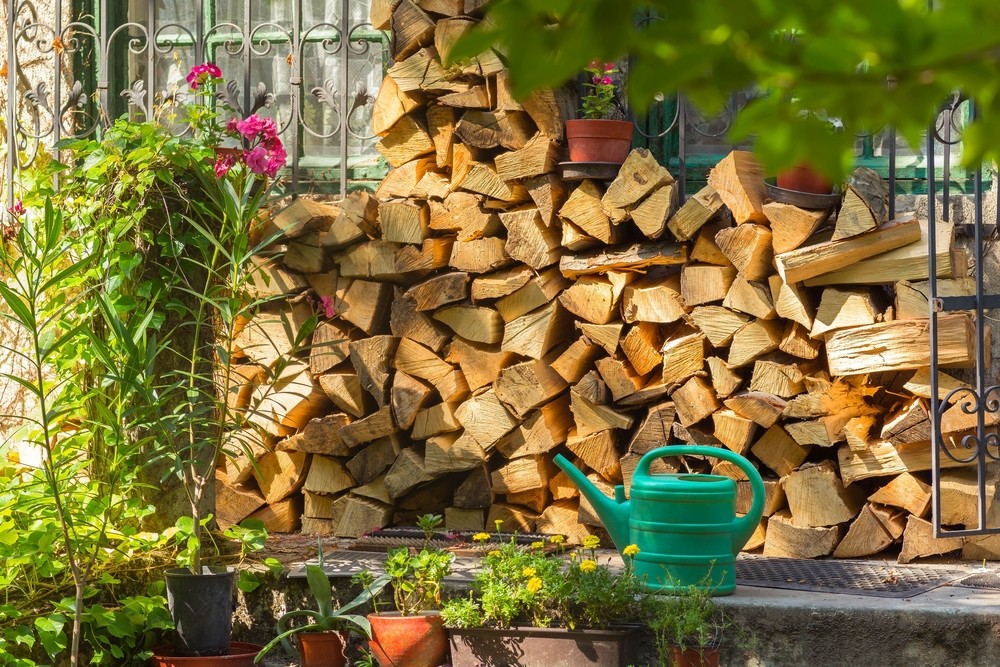
One of the most common places ticks dwell is in sloppy woodpiles that sit in shaded areas.
By keeping the wood neatly stacked, and in an area that gets some sun, it will dry out faster.
Those moist, wood areas are popular with ticks, but dry, sunny spots are not.
7. Maximize sunlight
Ticks need an environment of high humidity in order to survive, and as we mentioned, they love moisture.
That means you’ll not only have to take care of your woodpile.
Pruning back trees limbs and removing any other shade will help to keep the tick population down, in order to keep your “safe zone” as sunny as possible.
8. Use organic pesticides
We mentioned some of the plants that can repel ticks and host-carrying animals, but there are other substances that can keep them away too, serving as an organic pesticide.
Garlic, which is well-known to keep mosquitos away, can work on ticks too.
The best way to use it, is to make a garlic spray and spray down your yard and garden.
All you need is four garlic cloves, a tablespoon of mineral oil, a teaspoon of dish soap and some water.
- Mince the garlic cloves and then combine it with the mineral oil; allow the mixture to sit for a day.
- Strain out the minced garlic and then add the oil that remains and a teaspoon of dish soap to 2 cups of water.
- As your garlic mixture is now in a concentrated form, you need to dilute it before use. Do so by filling up a spray bottle with 2 cups of water, and then add in 2 tablespoons of the concentrated mixture.
- Shake to mix just before using. Be sure to test a little on small parts of your plants, and wait a day or two to make sure they aren’t damaged. If you do notice yellowing or damage, dilute your spray more by adding water.
9. Raise chickens
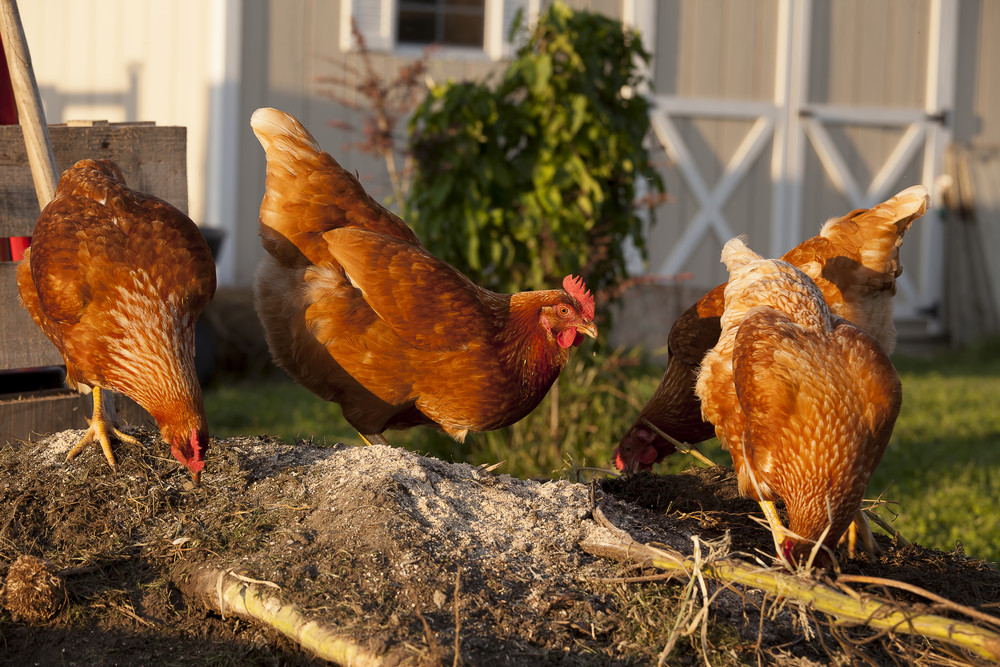
While it isn’t an option for everyone, if you can invest in a few chickens, raising chickens will not only provide you with a fresh source of eggs, but the animals will help you get rid of the ticks on your property – they love pecking away at them.
Other birds can help keep the tick population down, but some actually carry ticks, so it’s important to keep brush and debris far away from things like birdbaths and bird feeders, so if they happen to hitch a ride, the ticks will be less likely to survive.
Here are twenty more reasons to start raising backyard chickens.
